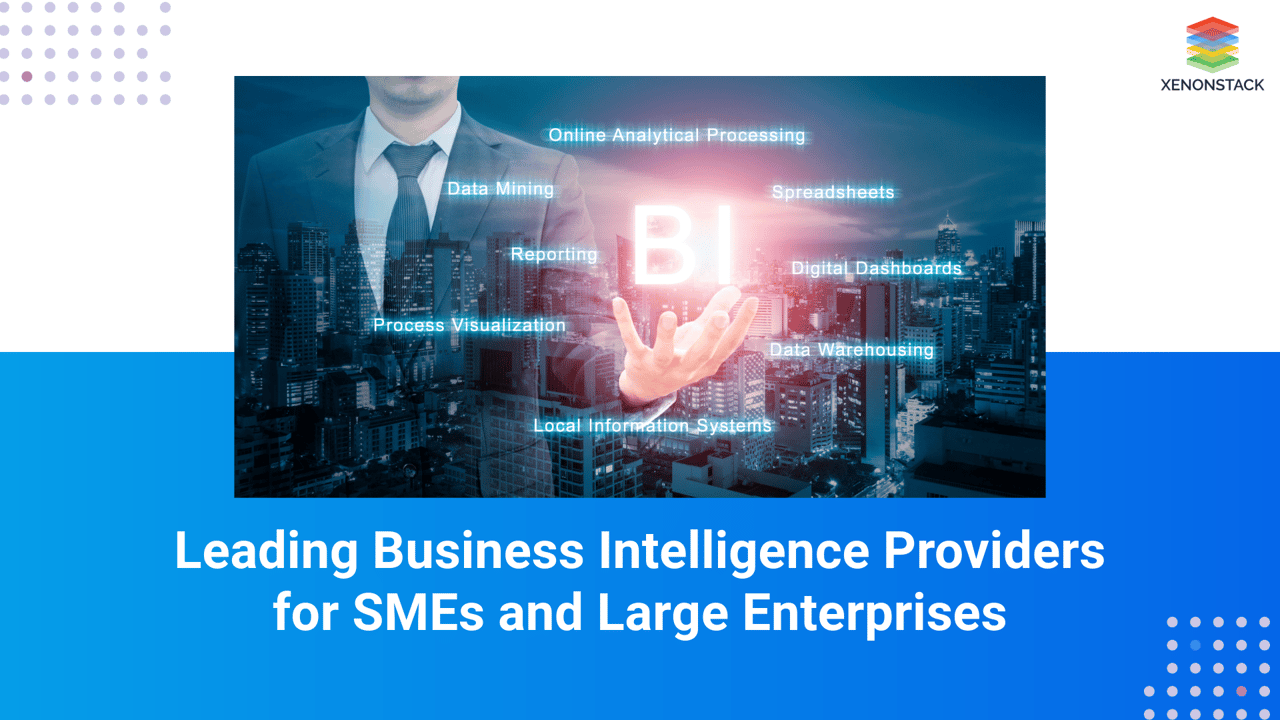
Why settle for guesswork when you have data at your fingertips? As businesses gather more data than ever before, it’s essential to have the right tools to harness its power. Business Intelligence (BI) provides the technology to convert complex data into meaningful insights that can drive operational and strategic decisions.
In this blog, we will explore the top BI companies, discuss what makes them essential for your business, and provide guidance on selecting the best BI tools and solutions. We’ll also highlight major trends in the BI landscape and delve into key trends and tools for data management and analytics.
Mindset for Successful BI Integration
Integrating Business Intelligence (BI) successfully requires more than tools—it demands a mindset shift across the organization. Here’s how businesses can prepare:
Why Business Intelligence Matters for SMEs and Enterprises
As data becomes a key asset, BI offers SMEs and enterprises the means to transform complex data into clear, actionable insights that drive business strategies and competitive advantage.
Driving Economic Growth
Business Intelligence (BI) enables SMEs to harness data to optimize decision-making, fostering innovation and driving job creation. For enterprises, BI scales operations, improving efficiencies and supporting long-term economic stability.
Fostering Innovation
SMEs use BI to explore niche opportunities, allowing them to stay agile and innovative. Enterprises leverage BI for data-driven strategies that implement groundbreaking innovations, maintaining a balance of creativity and efficiency.
Boosting Employment
With BI, SMEs can better assess business needs, leading to more local employment and sustainable growth. For larger enterprises, BI ensures streamlined workforce management and helps drive structured career paths globally.
Catering to Diverse Markets
SMEs use BI to understand and serve niche markets, offering personalized solutions. Meanwhile, enterprises use BI to optimize strategies for larger, diverse markets, effectively meeting broader consumer demands.
Encouraging Resilience
SMEs leverage BI to adapt quickly to changes in market trends, ensuring agility. Enterprises, on the other hand, utilize BI to maintain stability during market disruptions, enhancing economic resilience.
Promoting Global Competitiveness
Through BI, SMEs can analyze emerging trends, strengthening their position in local and international markets. For enterprises, BI fosters global expansion and robust supply chains and drives technological advancements that enhance national competitiveness.
Benefits of Adopting BI for SMEs and Enterprises
Business Intelligence (BI) offers valuable advantages for both SMEs and large enterprises, enabling them to optimize operations, enhance decision-making, and drive strategic growth.
Accelerators and Composable Architecture Offered by BI Companies
Accelerators and composable architecture revolutionize Business Intelligence (BI) by enabling faster, scalable, and customizable analytics solutions.
-
BI Accelerators for Quick Deployment: BI companies offer pre-built solutions to accelerate data integration and analytics setup, reducing time-to-value.
-
Modular, Custom Analytics Solutions: Composable architecture lets businesses combine BI components like dashboards and data sources to create tailored solutions.
-
Cloud Integration and Scalability: Cloud-based accelerators offer scalable, flexible solutions to handle growing data needs with reduced infrastructure costs.
-
Pre-built Dashboards and Reports: Out-of-the-box dashboards and reports provide immediate insights, allowing businesses to act quickly without building from scratch.
-
Real-Time Data Processing: BI accelerators include real-time data processing, enabling businesses to make fast, data-driven decisions as market trends evolve.
-
AI-Powered Insights: AI and machine learning (ML) capabilities in accelerators provide predictive analytics and automated insights for better decision-making.
-
Automated Data Quality Management: BI tools ensure data quality with automated processes that guarantee clean, accurate information for reliable insights.
-
Collaboration and Sharing: BI solutions include collaboration tools that allow teams to share reports and dashboards seamlessly across departments.
-
Scalable, Adaptive Architecture: Composable architecture allows businesses to scale and adapt their BI systems by adding new components as needs evolve.
-
Integration with Existing Systems: BI accelerators integrate smoothly with CRM, ERP, and other systems, ensuring continuity without disrupting workflows.
Key Factors to Consider When Choosing a BI Partner
When choosing a BI provider, businesses should evaluate several key factors to ensure they select the right partner:
-
Experience and Reputation: The success of your BI implementation depends on the experience and expertise of your provider. Look for companies with a proven track record of delivering high-quality BI solutions and check for case studies, client reviews, and testimonials.
-
Customization and Scalability: As your business grows, so will your BI needs. Choose a BI provider that offers customizable solutions that can scale with your organization's changing data and analytics requirements.
-
Ease of Use and User Experience: A BI tool's ease of use is crucial for user adoption. Ensure the platform is intuitive and user-friendly, enabling business users with minimal technical expertise to navigate and extract insights easily.
-
Integration with Other Tools: Seamless integration with your existing software and data sources is essential. A good BI provider should offer robust integration capabilities with other platforms, such as CRM systems, databases, and third-party tools.
-
Support for Cloud-Based Analytics: With the shift toward cloud computing, selecting a cloud-based BI solution is crucial. This enables real-time data access from any location and eliminates the need for on-site infrastructure.
-
Pricing: Budget is an important consideration for many businesses, particularly SMEs. Choose a BI platform that fits within your budget and offers scalable pricing models based on your company’s size and needs.
Evaluation Criteria for Selecting a BI Partner
|
Criteria |
Importance % |
|
Experience and Reputation |
20% |
|
Customization and Scalability |
20% |
|
Ease of Use and User Experience |
15% |
|
Integration with Other Tools |
15% |
|
Support for Cloud-Based Analytics |
15% |
|
Pricing |
15% |
Top Power BI Companies for Enterprise Organizations
For large enterprises with complex data requirements, it's essential to select a Power BI company that offers robust, scalable, and secure solutions. The following companies are known for providing top-tier enterprise BI solutions:
XenonStack
XenonStack provides an advanced analytics platform designed for large enterprises that need to process vast amounts of data quickly and efficiently. XenonStack’s integration with Power BI enhances the platform’s capabilities with AI-driven insights, helping enterprises make data-driven decisions faster and more accurately.
Microsoft Power BI
As the developer of Power BI, Microsoft offers the most comprehensive and flexible BI platform available. With its powerful data visualization capabilities, real-time insights, and integration with a wide range of business applications, Power BI is a preferred choice for enterprises of all sizes.
Tableau
Tableau is one of the most recognized names in the BI landscape, and it is known for its ability to create rich data visualizations and interactive dashboards. Its intuitive drag-and-drop interface and strong analytical capabilities make it a top choice for enterprises seeking to visualize complex datasets.
Qlik
Qlik’s associative data engine allows users to explore data across multiple dimensions and uncover insights that may otherwise be hidden. It’s ideal for large organizations looking to analyze complex data and get answers faster with self-service analytics.
Sisense
Sisense offers a highly customizable BI solution with robust data visualization capabilities. Its end-to-end analytics platform allows organizations to unify data from multiple sources and build interactive dashboards to drive insights across the enterprise.
Best Power BI Companies for SMEs
For small and medium-sized businesses (SMEs) looking for cost-effective yet powerful BI solutions, the following companies offer great tools that provide scalability, ease of use, and integration capabilities:
ElixirData
ElixirData offers robust data integration services that help SMEs integrate multiple data sources into a unified analytics system. It provides SMEs with the tools they need to gain deeper insights into their operations.
Zoho Analytics
Zoho Analytics is a self-service BI platform that allows SMEs to create custom reports and dashboards with ease. Its integration with other Zoho applications makes it an ideal choice for businesses looking to unify their data analytics efforts.
Google Data Studio
Google Data Studio offers free, customizable data visualization tools that allow businesses to create interactive reports and dashboards. It integrates seamlessly with Google Analytics, Google Ads, and other data sources, making it a great choice for small businesses.
Looker
Looker is a powerful cloud-based BI tool that offers deep data analysis and visualization capabilities. Its integration with cloud data warehouses makes it an ideal solution for SMEs looking for scalable, real-time analytics.
Oracle BI
Oracle BI provides SMEs with advanced analytics and reporting tools for both small and medium-sized enterprises. Its comprehensive capabilities in data analysis, dashboards, and data mining make it a great choice for businesses looking to leverage their existing Oracle databases and expand their analytics.
Innovative Power BI Companies for Startups
Startups need agile and cost-effective BI solutions that can grow with their business. The following companies offer scalable, innovative solutions tailored for fast-growing businesses:
NexaStack
NexaStack offers a scalable data management system for startups that need a robust yet cost-effective solution for integrating, managing, and analyzing large datasets. It is designed to grow alongside startups as they scale their operations.
Databox
Databox is an agile, cloud-based BI platform that provides startups with real-time data visualizations and performance tracking. It’s perfect for small teams looking to monitor KPIs and optimize business strategies.
AWS QuickSight
AWS QuickSight offers a cloud-based BI solution with machine learning-powered insights and scalability. Startups can leverage its fast, secure, and cost-effective solution to analyze data and make data-driven decisions without heavy upfront investment.
Metabase
Metabase is an open-source, user-friendly BI tool that helps startups with simple, intuitive data exploration and reporting. Its easy setup and integration capabilities make it ideal for startups seeking a cost-effective, flexible BI solution.
Akira AI
Akira AI leverages artificial intelligence (AI) to offer automated insights and predictive analytics for startups. Its easy-to-use platform helps fast-growing companies make intelligent, data-driven decisions while adapting to market changes.
Common Challenges in Adopting Power BI
Despite the growing importance of power business intelligence (BI) tools, many organizations face several challenges when trying to implement and fully leverage their potential:
-
Data Integration Challenges: Integrating data from various sources, especially legacy systems, can be complex, leading to compatibility issues that hinder insights extraction.
-
Training and Skill Gaps: Despite user-friendly interfaces, businesses must invest in training to ensure employees can fully utilize advanced analytics and data modeling.
-
Data Quality: Poor data quality—such as outdated or inconsistent data—can skew reports and lead to inaccurate decision-making.
-
Cost Considerations: While affordable initially, costs can rise as the business scales, requiring careful management of features, storage, and licensing expenses.
-
User Adoption and Change Management: Shifting from traditional systems to Power BI tools often meets resistance, making effective change management and training crucial for smooth adoption.
Best Practices for Successful BI Tool Implementation
Successful implementation of BI tools requires a strategic approach. To ensure a smooth rollout and maximize the potential of the tool, companies should follow these best practices:
-
Define Clear Objectives: Start by identifying the business goals that the BI tool will address. Whether the aim is improving data-driven decision-making, enabling self-service analytics, or enhancing predictive analytics, having clear objectives will guide the implementation process and ensure alignment with the organization’s strategic goals.
-
Ensure Proper Training: To adopt and fully utilize a BI platform, it’s essential to invest in team member training. This training should enable users to take full advantage of the tool’s advanced analytics features, create custom reports, and effectively use data visualizations to make informed decisions. Providing both initial and ongoing training will build users' confidence in using the platform and help them master its features.
-
Focus on Data Quality: The data fed into a BI tool must be clean, accurate, and up-to-date. Data quality is essential for ensuring the accuracy of insights and predictions. Poor-quality data can distort reports and result in incorrect conclusions, undermining the effectiveness of the BI platform.
-
Leverage Data Visualizations: Effective data visualization helps organizations turn complex data into actionable insights. By focusing on creating interactive dashboards and charts, businesses can make data more accessible and understandable, allowing decision-makers to act on key insights quickly.
-
Ensure Ongoing Support and Maintenance: For continued success, organizations must provide ongoing support for their BI platform. This includes regular updates, troubleshooting, and improvements as the business grows and its data needs evolve. Having a support structure in place for both self-service analytics and more complex requirements is crucial.
Unlock the future of business intelligence with Generative BI Consulting Services and Solutions. Harness the power of advanced AI and data-driven insights to create tailored, scalable solutions that drive smarter decision-making and operational excellence.
Understanding Key Market Trends in Business Intelligence
The BI market is rapidly evolving and driven by new technologies and applications. As businesses continue to adapt, the following trends are reshaping how organizations leverage data:
Cloud-Based Business Intelligence
The rise of cloud-based BI platforms has made data analytics more flexible and cost-effective. These platforms offer real-time visibility into data from anywhere, reducing the need for expensive on-premises solutions while enabling teams to collaborate seamlessly across geographies.
Data Visualization Tools
Effective data visualization is at the heart of BI tools. With dashboards, charts, and graphs, organizations can quickly identify patterns, track trends, and make informed decisions, even from complex datasets.
Self-Service Analytics
Self-service analytics is democratizing data access, enabling business users to generate reports and insights independently. This reduces reliance on IT teams and empowers employees at all levels to analyze data and drive decisions autonomously.
Predictive Analytics
Predictive analytics is becoming a crucial tool for businesses to anticipate future trends and outcomes. By leveraging historical data and advanced algorithms, organizations can predict customer behavior, market shifts, and operational inefficiencies.
AI-Powered Analytics
The integration of AI into BI tools is transforming data analysis. AI-powered analytics not only automate routine tasks but also provide predictive insights that enhance decision-making. These AI agents enable businesses to take proactive actions, optimizing workflows and improving operational efficiency.
Reimagining Business Intelligence in Modern Enterprises
Business Intelligence (BI) has become essential for businesses to turn raw data into valuable insights, enabling faster decision-making and enhancing overall performance.
Integration Imperative: Successful BI adoption requires seamless integration with existing systems, ensuring it adapts to changing business needs and drives real-time decision-making.
Keys to Success in the Future of BI
-
Composable BI Architectures: Build flexible BI systems that easily scale and evolve with new technologies, ensuring long-term relevance.
-
Outcome-Driven BI Strategies: Focus on measurable outcomes with iterative BI models to maximize value and avoid vendor lock-in.
-
Data Modernization: Implement data governance and efficient management practices to improve the quality and impact of BI insights.
-
Security and Governance in BI: Strengthen data security and governance to protect sensitive information and comply with regulations.
-
AI + Human Collaboration in BI: Combine AI with human expertise to generate deeper insights and make data-driven decisions.
-
Domain-Specific BI Solutions: Tailor BI to specific industries, addressing unique challenges and driving operational efficiencies.
Selecting the right BI company is critical to ensuring that you get the most value from your business intelligence tools. By considering factors such as scalability, ease of use, integration capabilities, and cost, businesses can choose the right BI solution that aligns with their needs. Whether you're a small business looking for self-service analytics or a large enterprise in need of a comprehensive business intelligence platform, BI providers offer powerful solutions that can improve decision-making, streamline operations, and help your business gain a competitive advantage.
Next Steps in Implementing Business Intelligence Solutions
Talk to our experts to explore how industries and different departments leverage agentic workflows and decision intelligence to become more decision-centric. By integrating AI into BI tools, businesses can automate and optimize IT support and operations, significantly enhancing efficiency, responsiveness, and overall decision-making capabilities.



